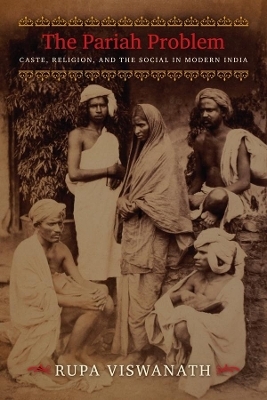
The Pariah Problem
Columbia University Press (Verlag)
978-0-231-16306-4 (ISBN)
Both the Indian public and colonial officials came to share a view compatible with missionary explanations, which meant all subsequent welfare efforts directed at Dalits focused on religious and social transformation rather than on structural reform. Methodologically, theoretically, and empirically, this book breaks new ground to demonstrate how events in the early decades of state-sponsored welfare directed at Dalits laid the groundwork for the present day, where the postcolonial state and well-meaning social and religious reformers continue to downplay Dalits' landlessness, violent suppression, and political subordination.
Rupa Viswanath is professor of Indian religions at the Centre for Modern Indian Studies at the University of Gottingen. She has held positions at the University of Pennsylvania and the University of Cambridge. Her interests include national minorities and practices of minoritization, comparative secularisms, slavery and race, transnational religious movements, religions and representative democracy, and political theory and the global south.
Acknowledgments Abbreviations Introduction 1. Land Tenure or Labor Control? The Agrarian Mise-en-Scene 2. Conceptualizing Pariah Conversion: Caste 3. The Pariah-Missionary Alliance: Agrarian Contestation and the Local State 4. The State and the Ceri 5. Settling Land 6. The Marriage of Sacred and Secular Authority: New Liberalism 7. Giving the Panchama a Home: Creating a Friction Where None Exists 8. Everyday Warfare: Caste 9. The Depressed Classes Conclusion: The Pariah Problem's Enduring Legacies Glossary Notes Bibliography Index
| Reihe/Serie | Cultures of History |
|---|---|
| Zusatzinfo | <B>Maps: </B>1, |
| Verlagsort | New York |
| Sprache | englisch |
| Maße | 152 x 229 mm |
| Themenwelt | Sachbuch/Ratgeber |
| Geisteswissenschaften ► Religion / Theologie ► Hinduismus | |
| Sozialwissenschaften ► Politik / Verwaltung | |
| Sozialwissenschaften ► Soziologie ► Makrosoziologie | |
| ISBN-10 | 0-231-16306-1 / 0231163061 |
| ISBN-13 | 978-0-231-16306-4 / 9780231163064 |
| Zustand | Neuware |
| Haben Sie eine Frage zum Produkt? |
aus dem Bereich


